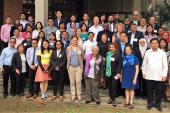Using open school data to improve transparency and accountability in Indonesia

Initiated in 2015, Sekolah Kita is a government-led school report card developed and administered by the Ministry of Education and Culture (MoEC). Cek Sekolahku was developed in 2014 by Transparency International Indonesia (TII), a civil society organization. The Sekolah Kita website stores the data of all schools in Indonesia including private and public schools, from kindergarten to upper secondary schools, as well as learning centres for non-formal education institutions across the country.
Cek Sekolahku is implemented in 182 schools in five districts including cities and Kabupaten, out of over 400 districts in Indonesia. Although not a nation-wide programme, the school data including school profiles and complaints published on the Cek Sekolahku website can be viewed by anyone.
Once the online system was in place, students and parents felt more comfortable giving feedback to schools.
This study involved two groups of participants: key informants and school-level actors. In total, 548 people participated in the survey. School-level data were collected from 17 lower secondary schools in three districts – Semarang, Makassar, and Bojonegoro – where both Sekolah Kita and Cek Sekolahku are operational.
Both Sekolah Kita and Cek Sekolahku are ground-breaking initiatives in the education sector in Indonesia. Prior to these initiatives, there were no national-level school report cards available online that allowed stakeholders and the public to provide feedback and complaints directly to schools. The initiatives were developed as a strategy to increase the quality of school-based management through participation. The aim of comparing and contrasting Sekolah Kita and Cek Sekolahku is to draw lessons from the two initiatives that could help decision-makers and educational managers make informed decisions about the design and implementation of open education data policies, with a view to promoting transparency and accountability in the education sector.
Selected recommendations
- Display and communicate clear theory of changes when designing school report cards
- Prioritize important datasets for parents
- Integrate transparency efforts into the blueprint for school improvement efforts
- Integrate transparency efforts into strategies for school improvement
Want to learn more?
About the author
Nisa Felicia is Dean of the Faculty of Education at Sampoerna University, Jakarta, Indonesia. She is also a researcher at the Center for Educational Studies and Policies (Pusat Studi Pendidikan dan Kebijakan), a non-profit organization in Indonesia. She earned her Doctoral degree from the Department of Educational Policy and Leadership at Albany State University of New York. Her dissertation dealt with educational opportunities for primary school children in Eastern Indonesia.



